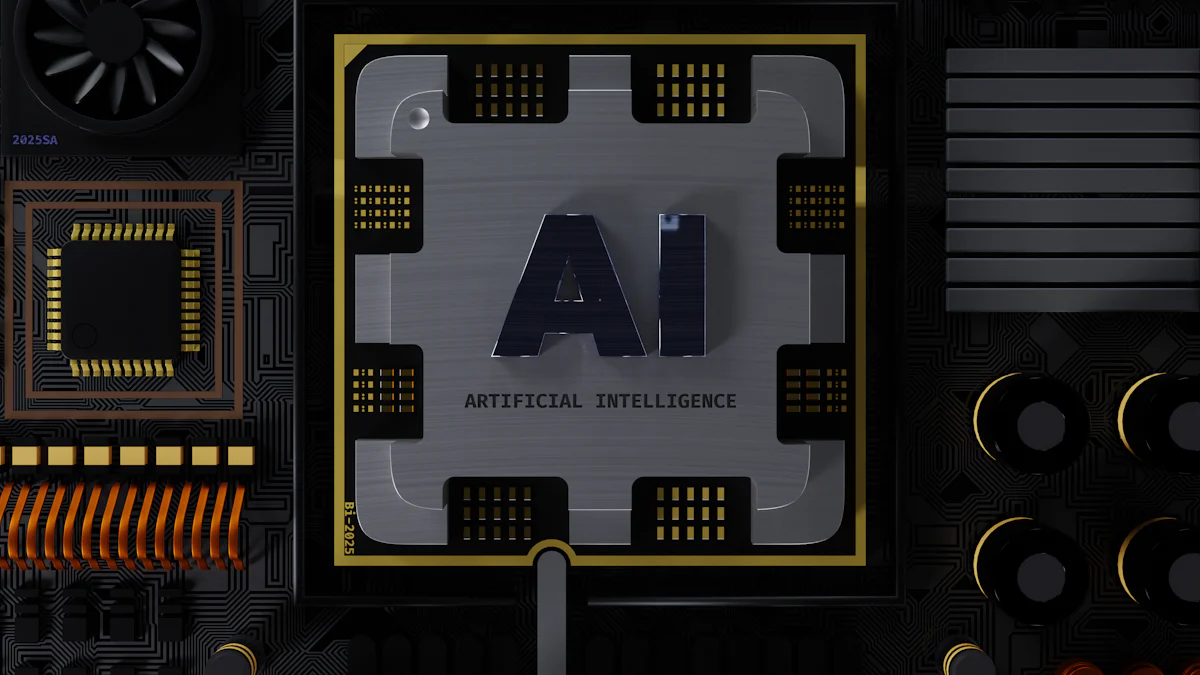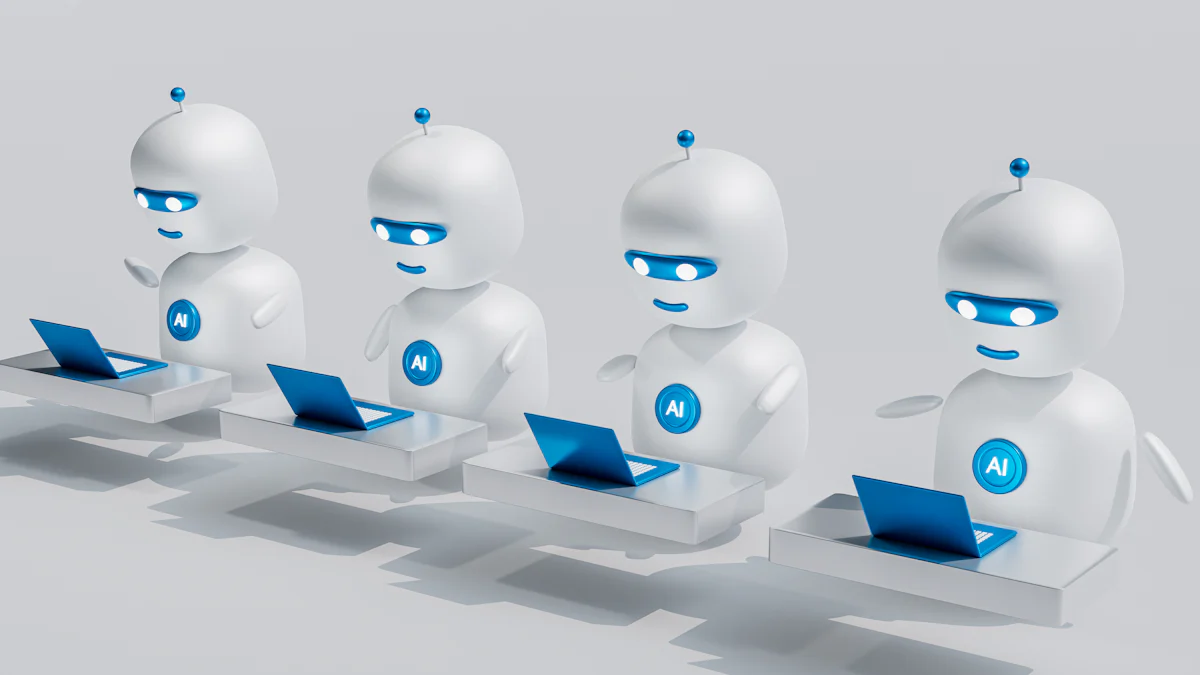Can AI Replace Customer Service in 2025

The question of "can AI replace customer service" by 2025 continues to spark curiosity and debate. AI has revolutionized the way businesses engage with their customers, providing unmatched efficiency and scalability. For instance, 63% of retailers are already utilizing AI to improve customer interactions, and 97% of telecommunications providers report higher satisfaction rates thanks to conversational AI. Despite these advancements, AI still falls short in emotional intelligence, a critical strength of human-driven customer service. For example, a patient dealing with sensitive issues may prefer the empathetic approach of a human agent.
Sobot, a leader in AI-driven customer service solutions, addresses this challenge by blending automation with human-like understanding. With Sobot AI, businesses can elevate their service quality while preserving the personal touch that customers value.
What Is AI-Powered Customer Service?

Defining AI-Powered Customer Service
AI-powered customer service uses advanced technology to improve how businesses interact with their customers. It minimizes the need for human involvement by automating repetitive tasks and enhancing response times. This approach ensures a better customer experience while reducing operational costs.
Several technologies drive this transformation:
- Automated AI Ticketing Systems
- AI Chatbots for Automation
- Virtual Assistants for Self-Service
- Predictive Analytics for Proactive Support
- Machine Learning and Natural Language Processing
Sobot, a leader in AI-driven solutions, offers tools that redefine customer service automation. Its AI chatbots provide instant responses, while its virtual assistants empower customers to resolve issues independently. These tools not only streamline customer support but also ensure businesses can scale their operations efficiently.
Current Capabilities of AI in Customer Service
Automating repetitive tasks and providing 24/7 support
AI in customer service excels at handling routine inquiries. For example, AI chatbots can manage millions of interactions simultaneously, ensuring immediate responses without long wait times. This capability allows businesses to provide 24/7 support, enhancing customer satisfaction. Additionally, robotic process automation (RPA) improves efficiency by automating simple tasks, enabling human agents to focus on complex issues.
Sobot's AI-powered customer service tools take this a step further. They combine automation with customer insights, helping businesses optimize their service delivery. This approach not only reduces costs but also improves the overall customer experience.
Real-time translation and multilingual capabilities
AI-powered customer service also breaks language barriers. Real-time translation tools allow businesses to communicate with customers in their native language. Studies show that 75% of consumers are more likely to make repeat purchases when support is offered in their language. Furthermore, 71.5% of service leaders agree that native language support boosts satisfaction.
Sobot's AI chatbots include multilingual capabilities, ensuring businesses can cater to a global audience. This feature not only enhances customer support but also builds loyalty by making customers feel understood and valued.
Strengths and Limitations of AI in Customer Service
Strengths of AI
Efficiency in handling high volumes of queries
AI excels at managing large volumes of customer inquiries simultaneously. Unlike humans, AI-powered tools like chatbots can provide instant responses to thousands of customers at once. This capability significantly reduces response times and ensures 24/7 availability. For example, AI automation allows businesses to handle routine tasks like order tracking or FAQs without delays.
Sobot's AI solutions enhance this efficiency further. By automating repetitive tasks, Sobot enables your team to focus on more complex customer needs. This approach not only improves productivity but also ensures a seamless customer experience.
Scalability and cost-effectiveness for businesses
AI offers unmatched scalability. As your business grows, AI tools can easily adapt to handle increased customer interactions without requiring additional resources. This scalability makes AI a cost-effective solution for businesses of all sizes.
| Strengths of AI in Customer Service | Description |
|---|---|
| Cost Reduction | Automating help-desk support tickets and creating self-service tools reduces operational costs. |
| Efficiency Improvement | AI assistants support agents, leading to faster resolution times. |
Sobot's AI-powered chatbots and virtual assistants empower businesses to scale operations while keeping costs low. These tools also provide valuable customer insights, helping you optimize your service strategies.
Limitations of AI
Lack of emotional intelligence and empathy
AI lacks the ability to understand emotions or respond empathetically. For instance, if a customer is upset about a delayed shipment for a special occasion, AI can only offer standard responses like tracking updates. It cannot acknowledge the emotional significance of the situation.
Human customer service agents, on the other hand, excel in empathy. They can interpret emotional cues and build rapport, which fosters trust and loyalty. While AI can enhance efficiency, it cannot replace the human touch in emotionally charged scenarios.
Inability to handle complex or nuanced customer issues
AI struggles with queries that require judgment or contextual understanding. For example, if a customer says, "The product doesn’t work like it did last time," AI may fail to determine whether "last time" refers to a previous purchase or a competitor’s product. This limitation can lead to misunderstandings and frustration.
Human customer service agents can navigate such complexities with critical thinking and personalized problem-solving. Sobot recognizes this gap and advocates for a hybrid approach, combining AI automation with human expertise to deliver comprehensive support.
The Unique Value of Human-Driven Customer Service
Empathy and Emotional Intelligence
Building trust and rapport with customers
Human customer service thrives on the human touch, which fosters trust and builds meaningful connections. Empathy plays a central role in this process. When you interact with a human agent, they can connect emotionally with you, affirm your feelings, and understand your frustrations. This emotional connection leads to personalized experiences that make you feel valued. For example, if you’re upset about a delayed delivery, a human agent can acknowledge your disappointment and offer a solution that feels tailored to your situation.
Empathy also strengthens customer loyalty. When you feel heard and understood, you’re more likely to return to the same business. Studies show that empathetic service increases satisfaction and retention rates. Even when an issue cannot be resolved immediately, the human touch ensures you leave the interaction feeling respected and cared for.
Addressing sensitive or emotional customer concerns
Certain situations require more than just efficiency. For instance, if you’re dealing with a personal or emotional issue, human customer service provides the sensitivity and understanding that AI cannot replicate. Human agents excel at handling delicate matters, such as complaints about healthcare services or financial disputes. They can adapt their tone and approach to suit your emotional state, ensuring you feel supported throughout the process.
Sobot recognizes the importance of empathy in customer service. While its AI tools enhance efficiency, Sobot emphasizes the value of human interaction for addressing sensitive concerns. This hybrid approach ensures you receive both speed and compassion.
Handling Complex and High-Stakes Situations
Scenarios where human agents excel over AI
Human agents shine in situations that require critical thinking and contextual understanding. For example, if you’re facing a technical issue with multiple variables, a human agent can ask clarifying questions and provide a tailored solution. AI often struggles with such complexities, as it relies on predefined algorithms.
High-stakes scenarios, such as resolving disputes or managing crises, also benefit from human involvement. A human agent can assess the situation, weigh the risks, and make decisions that prioritize your needs. This level of judgment and adaptability is something only humans can offer.
Personalized problem-solving and critical thinking
Personalization is a hallmark of human customer service. When you speak with a human agent, they can analyze your unique situation and craft a solution that feels customized. For instance, if you’re unhappy with a product, a human agent might offer a replacement, a refund, or even a discount on future purchases based on your preferences.
Critical thinking further enhances this personalization. Human agents can interpret ambiguous statements, identify underlying issues, and propose creative solutions. Sobot’s hybrid model combines the efficiency of AI with the problem-solving skills of human agents, ensuring you receive the best of both worlds.
Comparing AI and Human Customer Service
Efficiency and Scalability
AI's ability to handle large volumes quickly
AI excels in managing high volumes of customer interactions simultaneously. It operates 24/7, ensuring customers receive immediate responses regardless of time zones. For example, AI chatbots can handle thousands of inquiries at once, making them ideal for businesses with global audiences. This scalability reduces wait times and enhances the overall customer experience.
Sobot's AI-powered tools take this efficiency further. They automate routine tasks like order tracking and FAQs, allowing human agents to focus on more complex issues. This division of labor ensures your team can manage growing demands without compromising service quality.
| Aspect | AI Advantages | Human Advantages |
|---|---|---|
| Availability | 24/7 support | Limited operating hours |
| Scalability | Can handle high volumes of requests | Limited by the number of agents available |
| Cost-effectiveness | More cost-effective for routine inquiries | Higher staffing costs |
| Emotional understanding | Limited emotional understanding | Excels in emotional understanding |
| Complex problem-solving | Handles basic inquiries | Excels in complex problem-solving |
| Customer loyalty | Less effective in building trust | Builds trust and loyalty with customers |
The human role in ensuring quality and personalized interactions
Human agents bring a unique ability to personalize customer interactions. They use empathy and active listening to understand customer emotions and needs. For instance, when a customer feels frustrated, a human agent can adapt their tone and approach to reassure them. This emotional intelligence builds trust and loyalty.
Training plays a crucial role in enhancing these skills. Businesses can empower agents with tools like CRM systems to access customer history quickly. Role-playing exercises and empathy training further improve communication, ensuring every interaction feels tailored and meaningful.
Customer Satisfaction
The importance of empathy in building customer loyalty
Empathy is a cornerstone of customer satisfaction. It helps create emotional connections that foster loyalty. Studies reveal that 61% of consumers stop buying from companies due to poor customer experiences. When customers feel understood, they are more likely to return.
Human customer service excels in this area. Agents can interpret emotional cues and respond with compassion. For example, if a customer faces a personal issue, a human agent can provide support that feels genuine. This approach not only resolves the problem but also strengthens the relationship.
Balancing automation with human touch for optimal outcomes
A hybrid approach combines the strengths of AI and human agents to optimize customer satisfaction. AI handles routine tasks efficiently, while human agents address complex or emotionally charged issues. For example, Sobot's AI chatbots manage basic troubleshooting, seamlessly escalating more nuanced problems to human agents.
To implement this balance, businesses should identify tasks suitable for automation and train employees to enhance their interpersonal skills. Regular feedback loops help refine both AI systems and human interactions. This strategy ensures customers receive efficient service without losing the personal touch.
Future Trends in AI-Powered Customer Service

Advancements in AI by 2025
Improvements in emotional intelligence and contextual understanding
By 2025, AI will likely achieve significant advancements in emotional intelligence and contextual understanding. Current AI systems already analyze customer sentiment through text and voice cues. Future developments will enable AI to interpret emotions more accurately and respond in ways that feel human-like. For example, AI could detect frustration in a customer’s tone and adjust its responses to de-escalate the situation. These improvements will help AI bridge the gap between efficiency and empathy, creating a more satisfying customer experience.
Sobot continues to lead innovation in this area. Its AI tools already use natural language processing to understand customer intent. By 2025, Sobot aims to enhance these capabilities further, ensuring its solutions provide not only fast but also emotionally intelligent responses. This progress will allow businesses to deliver exceptional service while maintaining a personal touch.
Sobot's role in driving innovation in customer service automation
Sobot has consistently pushed the boundaries of customer service automation. Its AI-powered chatbots and virtual assistants streamline operations by handling routine inquiries and offering self-service options. These tools reduce wait times and improve efficiency. Looking ahead, Sobot plans to integrate advanced machine learning algorithms to make its systems even smarter.
For instance, Sobot’s upcoming features will include predictive analytics that anticipate customer needs before they arise. This proactive approach will help businesses resolve issues faster, enhancing customer satisfaction. Sobot’s commitment to innovation ensures you stay ahead in delivering top-tier service.
The Case for a Hybrid Approach
Combining AI efficiency with human empathy
A hybrid approach combines the strengths of AI and humans to create a balanced customer service strategy. AI handles repetitive tasks like order tracking, freeing human agents to focus on complex or emotional issues. This balance between AI and human efforts ensures customers receive efficient yet empathetic support.
This collaboration improves decision-making and enhances customer satisfaction. AI provides quick insights by analyzing large data sets, while human agents use these insights to offer personalized solutions. This synergy not only increases customer loyalty but also boosts retention rates. Businesses adopting this model can engage customers across multiple channels, ensuring a seamless experience.
Examples of successful hybrid models in customer service
Several companies have successfully implemented hybrid customer service models. For example, Amazon uses AI chatbots for routine inquiries and escalates complex issues to human agents. This approach ensures efficiency without compromising personalization. Similarly, an e-commerce platform enhanced its service by combining live chat, self-service tools, and dedicated representatives.
These models demonstrate the effectiveness of balancing AI and human efforts. AI-powered chatbots provide 24/7 availability, reducing wait times. Human agents focus on high-stakes scenarios, ensuring customers feel valued. This balance creates a robust system that meets diverse customer needs.
AI-powered customer service has transformed how businesses interact with customers. It excels in efficiency, offering 24/7 support and instant responses. However, it still struggles with empathy and complex problem-solving. Human-driven service remains vital for building trust and addressing nuanced issues. For example, human agents can adapt to emotional situations, ensuring customers feel valued.
A hybrid approach offers the best solution. Combining AI's speed with human empathy enhances customer satisfaction and loyalty. Sobot exemplifies this integration. Its AI-powered chatbot handles routine inquiries, while human agents focus on complex tasks. As Leo Chin, Vice President of Product at Sobot, explains, "We've enhanced our AI Agent's capabilities in AI settings, working processes, and beyond." This synergy ensures businesses deliver exceptional service in 2025 and beyond.
FAQ
What is the main advantage of AI in customer service?
AI provides unmatched efficiency. It handles repetitive tasks, offers 24/7 availability, and reduces wait times. For example, Sobot’s AI chatbots can instantly respond to thousands of inquiries, ensuring customers receive quick and accurate support.
Can AI fully replace human customer service?
AI cannot fully replace humans. It lacks emotional intelligence and struggles with complex issues. A hybrid approach, like Sobot’s model, combines AI’s efficiency with human empathy to deliver the best customer experience.
How does Sobot improve customer service?
Sobot uses AI-powered tools like chatbots and virtual assistants to automate routine tasks. These tools enhance efficiency and scalability while allowing human agents to focus on personalized and complex customer interactions.
Will AI become more empathetic by 2025?
AI will likely improve in emotional intelligence by 2025. Advancements in natural language processing and sentiment analysis will help AI better understand customer emotions. Sobot is already working on these innovations to enhance its AI tools.
Why is a hybrid approach important in customer service?
A hybrid approach balances AI’s speed with human empathy. AI handles routine tasks, while humans address complex or emotional issues. This combination ensures customers receive efficient and personalized service, improving satisfaction and loyalty.
See Also
Enhancing Efficiency With AI-Driven Customer Service Solutions
Transforming Support Through AI Customer Service Agents
Evaluating AI Solutions For Enterprise Call Centers